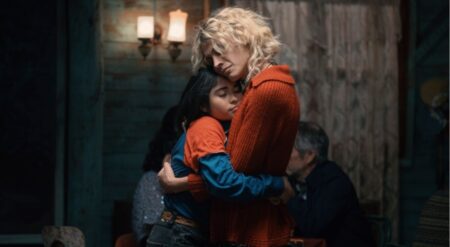
For this episode of Carolyn Talks… I speak with writer, director and producer Shatara Michelle Ford about Test Pattern, her debut feature film, and about how her approach as a filmmaker shows the connections between race, politics and gender create situations where victims of sexual assault are marginalized by the very systems that are supposed to offer support.
As an act, sexual assault or rape are about the perpetrator taking control away from the victim, and exerting their will and power over someone more vulnerable than them. For the victim this violence forces them into a state where who they were before, has been fundamentally changed, and for Renesha (Brittany S. Hall) it also reveals the ways Black women are offered little aid when they’re hurt and in need.
Opening with a scene of Renesha sitting on a bed in room with red lighting creating shadows in the background, things seem off…at first. The man in the room with her takes the glass slipping from between her fingers, and kisses her forehead as she leans on his shoulder. But then the horrible truth of what’s happening is realized when Renesha’s lack of response signals this isn’t right. She’s lethargic and unresponsive to him kissing her. This isn’t normal.
Before the audience can begin to fully process what’s happening, the tone of the film changes as the next scene is of Renesha lively, smiling and dancing with friends in a bar. Outside she’s approached by a shy guy Evan (Will Brill) who musters up the courage to introduce himself and ask for her number, despite the giggling and comments form the table full of women. On their first date they Renesha speaks about the challenges she faces working in corporate America. When she interrupts herself asking him to ignore it saying she doesn’t know what she’s talking about, he reassures her right and believes that she always knows what she’s speaking about. This is a good sign, for what woman isn’t looking for a partner willing to hear and listen to what they’re saying.
As a couple their life is good, happy and filled with light in the house they now share.
On the morning of her first day at her new job, Renesha comes into the kitchen wearing a yellow stripped dress, her hair freshly braided. She’s excited and a bit nervous to start working for a non-profit organization, just like she’s always wanted. But in this moment two things become occur to the viewer, the dress she’s wearing is the same from the opening scene, and the man in the room was not Evan, and you know this is where everything that happens afterwards perceived with a feeling of apprehension because we know what’s coming.
Later that night with Amber (Gail Bean), Renesha is unwinding, trying to relax when they’re approached by two white men who ingratiate themselves into the ladies’ space and time. Using charm and flattery one, Mike (Drew Fuller) convinces Renesha to dance with him after subtly hinting that she’s being stuck up for not wanting to let loose on a Monday night. This is a trick men use to pressure women into doing what they want because they that from young women are trained to acquiesce to men’s demands, and cajoling.
What happens next is the complete opposite to what we saw with Evan during the first time the couple made love, where he was gentle, asking if he was allowed to touch parts of her body, and was attentive to her responses. The next morning Mike barely looks as Renesha, and drops her off in the middle of the street close to Amber’s.
Once Renesha wakes up from a nap in Amber’s bed the film’s central theme about consent, victim’s rights, and lack of accessibility to help and care services come into play, beginning with Evan and Amber deciding Renesha should go to the hospital to be tested, despite her saying she wanted to go home.
On the worst day of her life, Renesha is forced to travel from hospital to clinic, to another hospital looking for a rape kit, if she finds one, there isn’t a doctor “qualified” to perform the test, and charge her exorbitant amounts of money for literally doing nothing, and threaten to hold her ID until she pays. How anything thinks this is ethical or morally right, in a situation like this is beyond comprehension. Once they find a hospital with a kit, the wait time until she can be seen is long and frustrating.
The staff, who are all white, are dismissive and show a lack of empathy for what she’s going through. Cognizant of how her every action and word can and will be perceived by these people, Renesha does her best to remain calm and even seems to shrink in on herself. Whereas Evan comfortable in his white male privilege, has no issues vocally expressing his anger and frustration, and loudly demanding a rape kit, showing no concern over the fact he’s letting a room full of complete strangers know what’s happened to Renesha. Violating her right to privacy and anonymity over something that’s intensely personal and traumatic.
Hall is quietly brilliant in her performance as she telegraphs everything Renesha is thinking and feeling through her body language and facial expressions. Her body signals her discomfort with the situation, but Evan is so caught up in what he wants to do, and have done for her, he ignores this. With Evan on one side doing what he thinks a supportive boyfriend should do, Renesha’s mental and emotional state, and patience are further challenged when administrative red tape proves to be an unforeseen stumbling block.
In a sequence overlaid with Tchaikovsky’s “Swan Lake” playing, the absurdity of this day is highlighted. The first time Renesha is shown any kind of empathy comes from a Black female nurse at the last hospital she visits, which is a start contrast to every interaction she’s had up till then, including those with Evan.
For the third act, the visual and musical tone of Test Patter becomes more sedate, as everything that has occurred begins to resonate with the characters, and audience. The cinematography by Ludovica Isidori perfectly compliments the story being told. The subtle use of bright colors in the beginning, then muted tones in later scenes underscores the severity of what’s taking place, which in turn is reflected in the costuming by Breonna Rose, and sets by production designer Eloise Ayala. I
In the beginning Renesha wore bright colors, the most predominant being yellow, but after hear assault this changes. Now she’s wearing beige and neutral tones symbolizing the change in her personality, and possibly outlook on life. As a Black woman she’s always known the world was harsh, but now she knows how much more unkind it could to be women on a day they need the most sympathy. Coming home from work she’s reminded how justice is as unattainable as equality when she drives past the forensic where her rape kit is being kept. Sitting in a dark room with hundreds and possibly thousands of others, forgotten by the police who deem them as not being worthy of proper investigation.
At home, Renesha and Evan’s relationship is strained. The ease that existed is no longer there, now they feel more like strangers than lovers.
With Test Pattern, Ford does her best to show how America’s politics affects Black women in a myriad of ways, many unknown until women are placed in these unfortunate circumstances. In a country run by men who continually prove through legislative measures that they don’t care about women – and victim’s rights – the bureaucratic pitfalls of a system meant to hinder, rather than help. Her directing and writing are is a nuanced and carefully constructed film that examines how the events surrounding the sexual assault of a Black woman affects her psychologically, tests her relationship with her white boyfriend, and uncovers the ways a society built on patriarchy and racism fails victims.
Visit KinoMarquee.com for show times of Test Pattern on virtual cinemas. You can follow Carolyn on Twitter and Instagram @Carriecnh12, and to access the African American Film Critics Association Virtual Roundtables mentioned, visit the YouTube Channel here.
About Shatara
Shatara Michelle Ford is a Black American filmmaker born in rural Arkansas and raised in St. Louis, Missouri. In 2010, she received an MFA in Screenwriting from Royal Holloway, University of London.
Shatara’s work explores class, power, womanhood, identity, perception and race. Intellectually propelled by the LA Rebellion film movement and stylistically influenced by Neoclassical directors; her films feature marginalized characters with rich internal lives that defy dominant stereotypes. Her script, Queen Elizabeth was featured on the 2017 Black List. Test Pattern is her debut feature.






